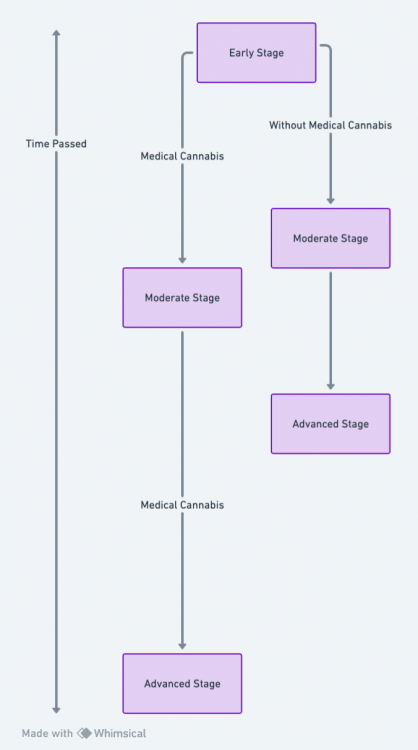
Disease Progression and Medical Cannabis: A Complex Interaction
Disease states often evolve through various stages—early, moderate, and advanced—and the effects of cannabinoids like THC and CBD can impact these stages differently. In some conditions, the symptomatic relief offered by cannabis might be more effective in the earlier stages and less so in the later stages. On the other hand, the anti-inflammatory properties of cannabis could have a varying impact depending on the disease’s stage.
Example Disease States:
1. Multiple Sclerosis (MS): Research suggests that cannabinoids may help alleviate symptoms like spasticity and pain in the early to moderate stages of MS but could be less effective as the disease progresses (1).
2. Rheumatoid Arthritis: Cannabis’ anti-inflammatory properties may help reduce inflammation and joint damage in early stages but may not be as beneficial in the advanced stages where irreversible joint deformity has occurred (2).
Anti-inflammatory Impact Across Disease States:
Inflammatory Bowel Disease (IBD): The anti-inflammatory action of cannabis may help control symptoms during flare-ups in the early and moderate stages, but its efficacy in advanced stages with complications like strictures is less clear (3).
Comparison Table
| Disease Stage | Impact of THC | Impact of CBD | Impact of THC + CBD |
|---|---|---|---|
| Early (e.g., MS) | Reduces Spasticity | Alleviates pain | Combined effect |
| Moderate (e.g., MS) | Reduced effectiveness | Reduced effectiveness | Combined effect |
| Advanced (e.g., MS) | Symptom Support, Palliation | Symptom Support, Palliation | Symptom Support, Palliation |
References:
- Zajicek, J., et al. “Cannabinoids for treatment of spasticity and other symptoms related to multiple sclerosis (CAMS study): multicentre randomised placebo-controlled trial.” The Lancet 362.9395 (2003): 1517-1526.
- Blake, David R., et al. “Preliminary assessment of the efficacy, tolerability and safety of a cannabis-based medicine (Sativex) in the treatment of pain caused by rheumatoid arthritis.” Rheumatology 45.1 (2006): 50-52.
- Lal, Simon, et al. “Cannabis use amongst patients with inflammatory bowel disease.” European journal of gastroenterology & hepatology 23.10 (2011): 891-896.
Cautionary Note:
Individuals with the following medical illnesses and diagnoses should exercise caution when considering cannabinoid therapies and contact Dr. Caplan at CED Clinic for expert guidance:
- Cardiovascular Diseases
- Psychiatric Disorders like Schizophrenia
- Liver Disease
📗 Note: The diagram’s your horoscope; the book is your celestial map. Navigate your way to wisdom here 📗

Disease Progression and Medical Cannabis: A Deep Dive
Exploring the relationship between disease progression and medical cannabis reveals a complex landscape of therapeutic potential, challenges, and considerations. The impact of medical cannabis on disease progression varies across different conditions, necessitating a nuanced understanding of its role in chronic disease management.
CBD’s effects on slowing disease progression have garnered attention for conditions such as multiple sclerosis, Parkinson’s disease, and certain types of cancer, offering hope for symptom management and possibly altering disease trajectories. Similarly, THC therapy has shown promise in symptom relief, particularly for pain and nausea associated with a variety of chronic conditions.
The role of cannabinoids in chronic disease treatment extends beyond symptom management to potentially influencing disease mechanisms themselves. With ongoing studies on cannabis and disease progression rates, there’s a growing body of evidence supporting the use of medical cannabis in palliative care settings, where improving quality of life becomes the primary focus.
Long-term effects of cannabis on health conditions remain a key area of research, as understanding the full spectrum of therapeutic and adverse effects is essential for developing effective cannabis treatment strategies for chronic diseases. Patient outcomes with medical marijuana therapy have been positive in many cases, highlighting the importance of cannabinoid research in disease modification.
The integration of medical cannabis into treatment regimens offers a new dimension to disease management, emphasizing the need for personalized cannabis treatment plans that consider the individual’s condition, symptoms, and response to therapy. Comparative studies on cannabis versus traditional treatments provide valuable insights into its efficacy and safety, guiding clinical decisions and patient care.
Cannabis-based interventions have shown significant potential in providing symptom relief, particularly in disease-related pain and inflammation. The role of medical marijuana in autoimmune diseases and the use of CBD oil for symptom control in chronic illnesses further illustrate the therapeutic versatility of cannabinoids.
As research continues to evolve, understanding cannabinoid mechanisms in disease treatment becomes increasingly important, informing the development of targeted therapies that leverage the benefits of CBD and THC while minimizing risks. The future directions in cannabis research for disease therapy are promising, with the potential to revolutionize treatment approaches for chronic diseases, improve patient outcomes, and enhance quality of life for those living with chronic conditions.


